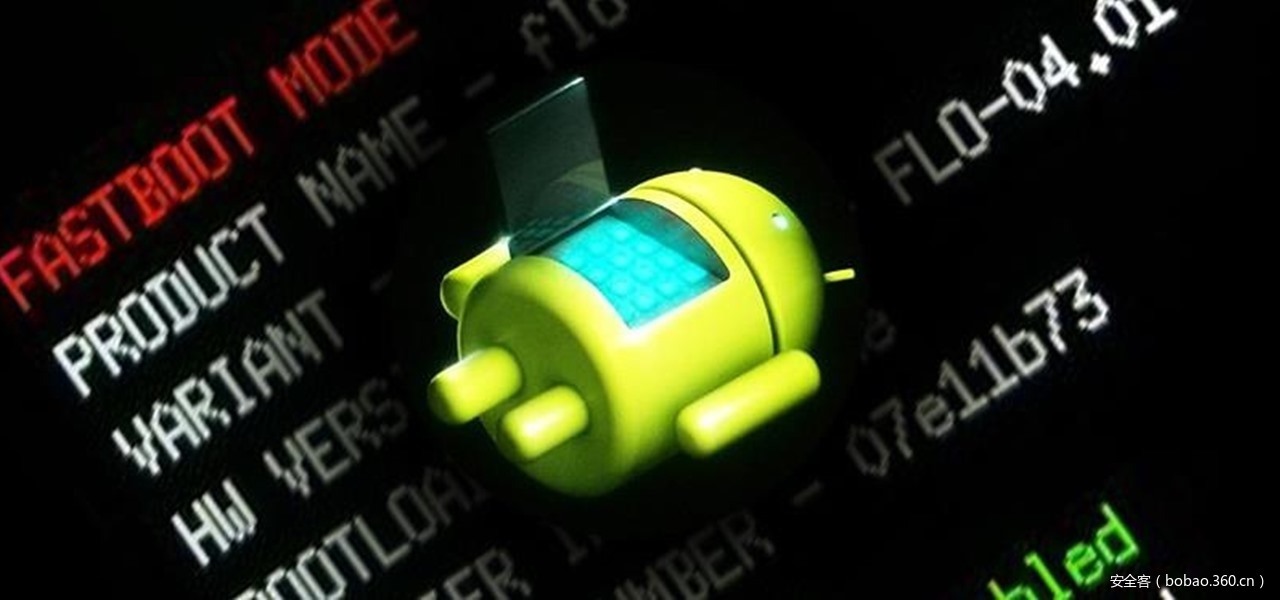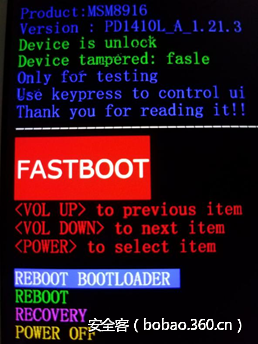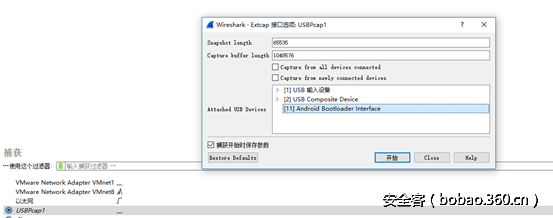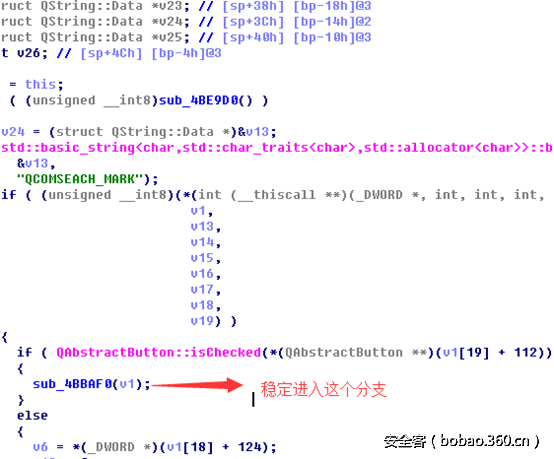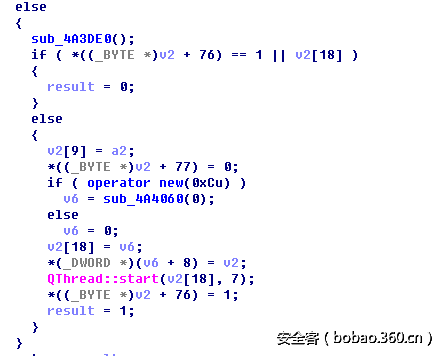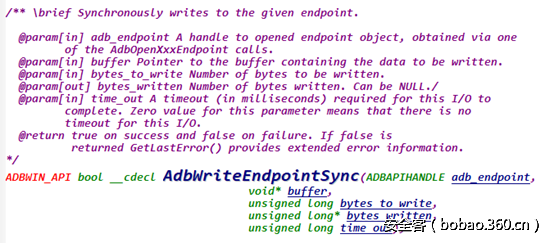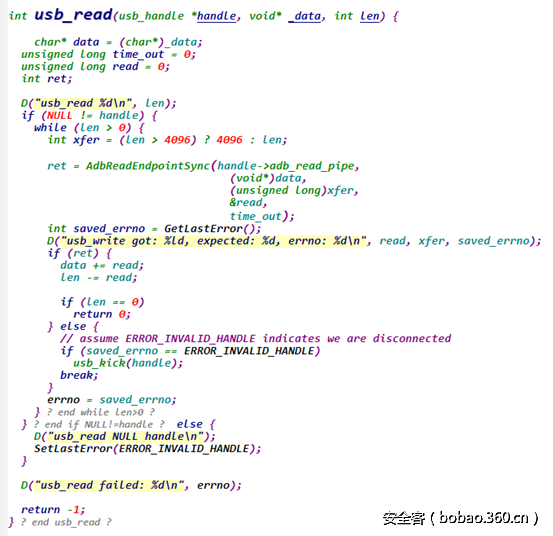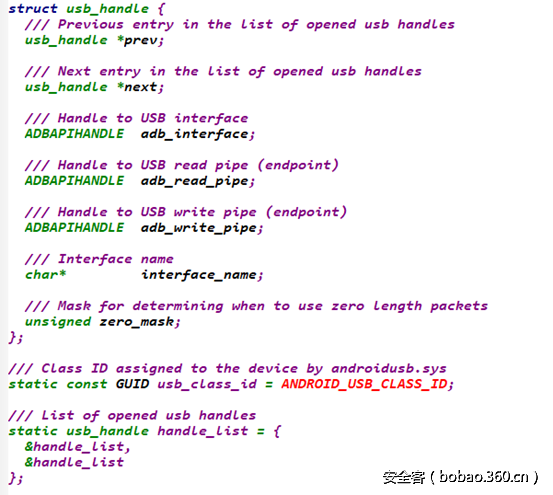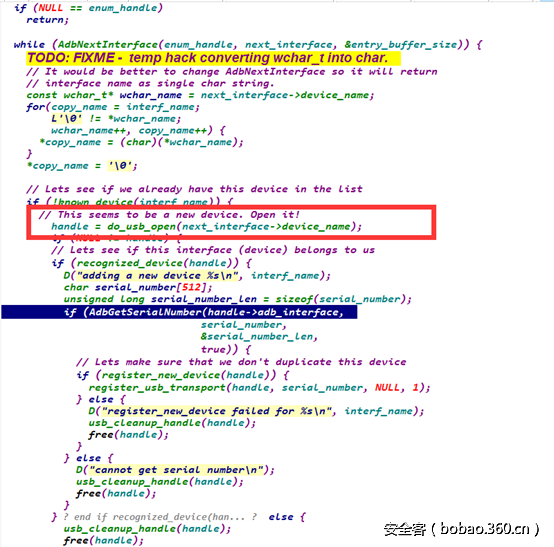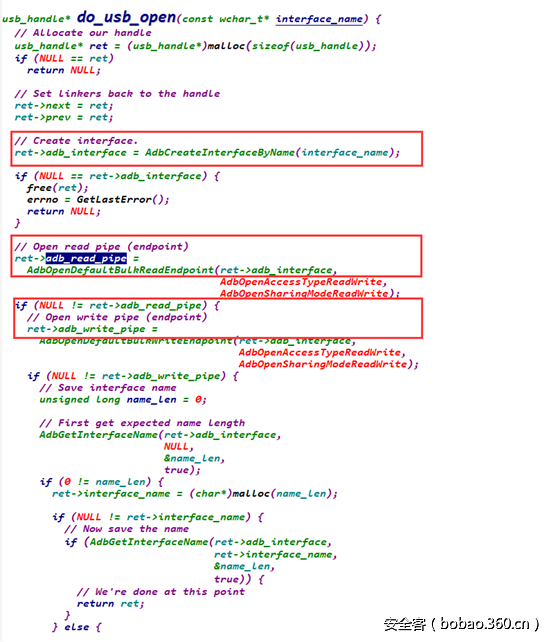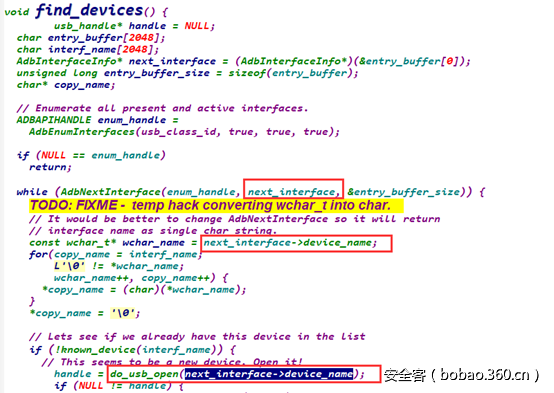作者:Yan_1_20
预估稿费:300RMB
投稿方式:发送邮件至linwei#360.cn,或登陆网页版在线投稿
0x00 起因
学习android安全的朋友都应该熟悉adb,fastboot这两个工具,但是其实现方式网上却没有多少资料,在下对这些知识也非好奇,一次机会对某手机的售后刷机工具aftool进行对手机刷机时,发现了它的软件包里没有fastboot.exe,但是却执行了fastboot命令,猜测他可能自己实现了fastboot.exe的功能,就想对其进行逆向分析执行fastboot的命令的核心代码。
0x01 调试环境配置
工具:IDA ,Ollydbg,Wireshark,Source Insight3
Aftool download link:
http://pan.baidu.com/s/1c0AVz9I
Adb source code download link:
http://pan.baidu.com/s/1hrVZFxU
安装AF_UPGRADE_PKG.exe后,aftool.exe为目标文件
0x02 fastboot.exe 和fastboot 模式通信的数据包
我们手机进入fastboot, 使用wireshark 抓取usb数据包,观察数据包数量以及格式
进入fastboot的方法:
[1](命令)使用 adb reboot-bootloader
[2](按键)音量减键+电源键
使用wireshark 捕获usb包
选择接口 android Bootloader interface
使用fastboot.exe 发送命令 fastboot reboot-bootloader
同时wireshark捕获到的数据包为:
URB_BULK out 的数据为:
URB_BULK in 的数据为:
可以大胆猜测 URB_BULK out 就是我们使用的fastboot的命令 fastboot reboot-bootloaderURB_BULK int 就是手机端给的回应
但是上面三个特殊的数据包 和我们发的数据没有任何关系,但是看其名称”Request,Response,Status”猜测可能是fastboot的通信协议的 建立协议的数据包
0x03 aftool.exe 和fastboot 模式通信的数据包
Aftool的使用方法:
[1]切换成高通手机
[2]点击选择按钮 加X520_recovery目录下的fastboot_flash_all.bat
[3]点击下载按钮 开始执行fastboot_flash_all.bat里面的命令
对wireshark的处理方式和上面类型
捕获的数据包如下图
看来和fastboot的数据包格式一致,只是多发送了一条命令
现在的思路就是 Ollydbg 调试aftool ,假如执行了某个函数同时wireshark上有数据包产生那么这个函数就是通信使用的函数
0x04 逆向aftool.exe
这个工具是使用Qt编写,没有加壳子,没有加混淆,对我这种小白来说,最大的难题可能就是怎么在Qt的架构里找到”下载”按钮的处理函数了。
一开始我是没有思路的,由于不知道这个下载按钮里进行了操作,我给它下断点都不知道用什么函数下什么断点。但是想到了旁边还有一个”选择”按钮,加载bat文件肯定有文件读取的操作 于是对ReadFile 下了断点。果然断了下,然后通过回溯。找到了它的UI消息处理函数sub_4E22C0。
最后确定了sub_4E22C0 中调用的sub_4BFD30就是”下载”按钮响应事件,
在sub_4BFD30里分支比较多 但是ollydbg跟了几次之后 发现其执行的分支稳定执行
sub_4BBAF0
但是sub_4BBAF0的代码逻辑看起来很简单并没有多少值得注意的代码,但是在OD里跟着sub_4BBAF0 按F9就会跑起来,看来是这个函数没错,但是应该是错过了什么
在sub_4BBAF0里的下层函数sub_4B7DB0,以及sub_4B7DB0的下层函数sub_4A3F30找到了如下代码
可以的它开了一个线程
但是参考Qt QThread::start()的用法 这里传入的参数可能是ida的没有使用类的方式调用吧
直接用ollydbg动态调到他这里来。得到了v2[18]的值742D345e(742D345e不是定值)
接着有两个函数需要F7
742D34C2 E8 51FFFFFF call msvcr90.742D3418
742D3430 FF50 54 call dword ptr ds:[eax+0x54]恭喜最后来到了
004A411A . E8 914B0000 call AFTool.004A8CB0sub_4A8CB0就是真正处理函数
接着在ollydbg IDA里跟了跟这个函数观察
//reboot-bootloader
004A908C |. E8 3F190000 call AFTool.004AA9D0发现AFTool.004AA9D0 这个函数就是给手机发数据的函数
004AA9D0 里最重要的就是下面的函数
004AAA58 |. 52 |push edx
004AAA59 |. 8B5424 34 |mov edx,dword ptr ss:[esp+0x34] ; AFTool.0052D4B8
004AAA5D |. 8D4C24 18 |lea ecx,dword ptr ss:[esp+0x18]
004AAA61 |. 51 |push ecx
004AAA62 |. 50 |push eax
004AAA63 |. 8B42 08 |mov eax,dword ptr ds:[edx+0x8]
004AAA66 |. 55 |push ebp
004AAA67 |. 50 |push eax
004AAA68 |. FF15 1CC05000 |call dword ptr ds:[<&AdbWinApi.AdbWrite>; AdbWinAp.AdbWriteEndpointSync堆栈如图:
esp-> 09A2F978 00000008
09A2F97C 09A2FD1C ASCII "reboot-bootloader"
09A2F980 00000011
09A2F984 09A2F9A0
09A2F988 0000027C<注意:这个函数执行之前Wireshark里已经有了那三条特殊的数据包了,这个函数执行之后Wireshark会增加 URB_BULK out >
所以发送命令API函数就是 AdbWinAPi.dll里的导出函数 AdbWriteEndpointSync
类似的找到了发出别的4条数据包的具体函数(其实三条特殊数据包的是一个函数发的)
AdbGetSerialNumber ------>GET DESCRIPTOR Request STRING
------>GET DESCRIPTOR Response STRING
------>GET DESCRIPTOR Status
AdbReadEndpointSync ------>URB_BULK in0x05 API调用分析
现在找到了API接下来就是参考源码对这些API传入正确参数并调用了。
我们一开始假设的是前三条数据包是建立协议链接 类似socket编程accept函数返回的sock
然后AdbWriteEndpointSync 类似 send函数 使用这个sock进行通信
在源码里找了AdbWriteEndpointSync 声明(使用dll里的导出函数),调用
声明:
调用:
在usb_write 下面就是 usb_read的定义
通过上面的代码可以看出AdbWriteEndpointSync,AdbReadEndpointSync使用的第一个参数都是同一个结构体里的不同成员变量
这个结构体的声明如下
接着关于adb_write_pipe和adb_read_pipe变量的赋值
但是搜索无果,搜索调用函数usb_write的函数时,能搜索到,但是没有找到他的参数传递
换了一个思路对AdbGetSerialNumber调用进行了寻找
比起这个调用,上面的do_usb_open函数返回的handle则是引起了我的兴趣,其定义如下。
通过其定义可以看出,do_usb_open 里完成了对结构体usb_handle的分配已经赋值。
通过do_usb_open 返回的关键性结构体,我们就可以对AdbWriteEndpointSync 进行调用。
至于do_usb_open的参数来源 则是 上面的API AdbNextInterface进行的赋值
所以我们已经在源码里找到了我们需要的API的调用参数的来源。
0x06 整合代码
通过整合。得了如下的代码
<注意:一定要把AdbWinApi.dll AdbWinUsbApi.dll放到这个项目里编译>
// adb_test.cpp : 定义控制台应用程序的入口点。
//
#include "stdafx.h"
#include<windows.h>
#define ADB_MUTEX_INITIALIZER PTHREAD_MUTEX_INITIALIZER
typedef void* ADBAPIHANDLE;
typedef struct _AdbInterfaceInfo {
/// Inteface's class id (see SP_DEVICE_INTERFACE_DATA for details)
GUID class_id;
/// Interface flags (see SP_DEVICE_INTERFACE_DATA for details)
unsigned long flags;
/// Device name for the interface (see SP_DEVICE_INTERFACE_DETAIL_DATA
/// for details)
wchar_t device_name[1];
} AdbInterfaceInfo;
struct usb_handle {
/// Previous entry in the list of opened usb handles
usb_handle *prev;
/// Next entry in the list of opened usb handles
usb_handle *next;
/// Handle to USB interface
ADBAPIHANDLE adb_interface;
/// Handle to USB read pipe (endpoint)
ADBAPIHANDLE adb_read_pipe;
/// Handle to USB write pipe (endpoint)
ADBAPIHANDLE adb_write_pipe;
/// Interface name
char* interface_name;
/// Mask for determining when to use zero length packets
unsigned zero_mask;
};
typedef enum _AdbOpenAccessType {
/// Opens for read and write access.
AdbOpenAccessTypeReadWrite,
/// Opens for read only access.
AdbOpenAccessTypeRead,
/// Opens for write only access.
AdbOpenAccessTypeWrite,
/// Opens for querying information.
AdbOpenAccessTypeQueryInfo,
} AdbOpenAccessType;
typedef enum _AdbOpenSharingMode {
/// Shares read and write.
AdbOpenSharingModeReadWrite,
/// Shares only read.
AdbOpenSharingModeRead,
/// Shares only write.
AdbOpenSharingModeWrite,
/// Opens exclusive.
AdbOpenSharingModeExclusive,
} AdbOpenSharingMode;
#define ANDROID_USB_CLASS_ID
{0xf72fe0d4, 0xcbcb, 0x407d, {0x88, 0x14, 0x9e, 0xd6, 0x73, 0xd0, 0xdd, 0x6b}};
struct usb_ifc_info
{
unsigned __int16 dev_vendor;
unsigned __int16 dev_product;
unsigned __int8 dev_class;
unsigned __int8 dev_subclass;
unsigned __int8 dev_protocol;
unsigned __int8 ifc_class;
unsigned __int8 ifc_subclass;
unsigned __int8 ifc_protocol;
unsigned __int8 has_bulk_in;
unsigned __int8 has_bulk_out;
unsigned __int8 writable;
char serial_number[256];
char device_path[256];
};
typedef struct _USB_DEVICE_DESCRIPTOR {
UCHAR bLength;
UCHAR bDescriptorType;
USHORT bcdUSB;
UCHAR bDeviceClass;
UCHAR bDeviceSubClass;
UCHAR bDeviceProtocol;
UCHAR bMaxPacketSize0;
USHORT idVendor;
USHORT idProduct;
USHORT bcdDevice;
UCHAR iManufacturer;
UCHAR iProduct;
UCHAR iSerialNumber;
UCHAR bNumConfigurations;
} USB_DEVICE_DESCRIPTOR, *PUSB_DEVICE_DESCRIPTOR;
typedef struct _USB_INTERFACE_DESCRIPTOR {
UCHAR bLength;
UCHAR bDescriptorType;
UCHAR bInterfaceNumber;
UCHAR bAlternateSetting;
UCHAR bNumEndpoints;
UCHAR bInterfaceClass;
UCHAR bInterfaceSubClass;
UCHAR bInterfaceProtocol;
UCHAR iInterface;
} USB_INTERFACE_DESCRIPTOR, *PUSB_INTERFACE_DESCRIPTOR;
typedef int(*AdbWriteEndpointSync_)(ADBAPIHANDLE, char*, int, int *, int);
typedef void* (*AdbCreateInterfaceByName_)(const wchar_t*);
typedef void* (*AdbOpenDefaultBulkWriteEndpoint_)(ADBAPIHANDLE, AdbOpenAccessType, AdbOpenSharingMode);
typedef bool(*AdbNextInterface_)(ADBAPIHANDLE, AdbInterfaceInfo*, unsigned long* size);
typedef void* (*AdbEnumInterfaces_)(GUID, bool, bool, bool);
typedef ADBAPIHANDLE(*AdbOpenDefaultBulkReadEndpoint_)(ADBAPIHANDLE, AdbOpenAccessType, AdbOpenSharingMode);
typedef bool(*AdbGetInterfaceName_)(ADBAPIHANDLE adb_interface,
void* buffer,
unsigned long* buffer_char_size,
bool ansi);
typedef bool(*AdbCloseHandle_)(ADBAPIHANDLE adb_handle);
typedef bool(*AdbGetUsbDeviceDescriptor_)(ADBAPIHANDLE, USB_DEVICE_DESCRIPTOR*);
typedef bool(*AdbGetUsbInterfaceDescriptor_)(ADBAPIHANDLE, USB_INTERFACE_DESCRIPTOR*);
typedef bool(*AdbGetSerialNumber_)(ADBAPIHANDLE, void*, unsigned long*, bool);
typedef bool(*AdbReadEndpointSync_) (ADBAPIHANDLE,
void*,
unsigned long,
unsigned long*,
unsigned long);
AdbWriteEndpointSync_ AdbWriteEndpointSync;
AdbCreateInterfaceByName_ AdbCreateInterfaceByName;
AdbOpenDefaultBulkWriteEndpoint_ AdbOpenDefaultBulkWriteEndpoint;
AdbNextInterface_ AdbNextInterface;
AdbEnumInterfaces_ AdbEnumInterfaces;
AdbOpenDefaultBulkReadEndpoint_ AdbOpenDefaultBulkReadEndpoint;
AdbGetInterfaceName_ AdbGetInterfaceName;
AdbCloseHandle_ AdbCloseHandle;
AdbGetUsbDeviceDescriptor_ AdbGetUsbDeviceDescriptor;
AdbGetUsbInterfaceDescriptor_ AdbGetUsbInterfaceDescriptor;
AdbGetSerialNumber_ AdbGetSerialNumber;
AdbReadEndpointSync_ AdbReadEndpointSync;
usb_handle* do_usb_open(const wchar_t* interface_name);
void usb_cleanup_handle(usb_handle* handle);
int recognized_device(usb_handle* handle);
int main()
{
int d;
char getvar[] = "getvar:product";
char rebootbl[] = "reboot-bootloader";
HMODULE a = LoadLibrary(L"AdbWinApi.dll");
AdbWriteEndpointSync = (AdbWriteEndpointSync_)GetProcAddress(a, "AdbWriteEndpointSync");
AdbCreateInterfaceByName = (AdbCreateInterfaceByName_)GetProcAddress(a, "AdbCreateInterfaceByName");
AdbOpenDefaultBulkWriteEndpoint = (AdbOpenDefaultBulkWriteEndpoint_)GetProcAddress(a, "AdbOpenDefaultBulkWriteEndpoint");
AdbNextInterface = (AdbNextInterface_)GetProcAddress(a, "AdbNextInterface");
AdbEnumInterfaces = (AdbEnumInterfaces_)GetProcAddress(a, "AdbEnumInterfaces");
AdbOpenDefaultBulkReadEndpoint = (AdbOpenDefaultBulkReadEndpoint_)GetProcAddress(a, "AdbOpenDefaultBulkReadEndpoint");
AdbGetInterfaceName = (AdbGetInterfaceName_)GetProcAddress(a, "AdbGetInterfaceName");
AdbCloseHandle = (AdbCloseHandle_)GetProcAddress(a, "AdbCloseHandle");
AdbGetUsbDeviceDescriptor = (AdbGetUsbDeviceDescriptor_)GetProcAddress(a, "AdbGetUsbDeviceDescriptor");
AdbGetUsbInterfaceDescriptor = (AdbGetUsbInterfaceDescriptor_)GetProcAddress(a, "AdbGetUsbInterfaceDescriptor");
AdbGetSerialNumber = (AdbGetSerialNumber_)GetProcAddress(a, "AdbGetSerialNumber");
AdbReadEndpointSync = (AdbReadEndpointSync_)GetProcAddress(a, "AdbReadEndpointSync");
usb_handle* handle = NULL;
char entry_buffer[2048];
char interf_name[2048];
char read[2048];
int ArgList;
AdbInterfaceInfo* next_interface = (AdbInterfaceInfo*)(&entry_buffer[0]);
unsigned long entry_buffer_size = sizeof(entry_buffer);
char* copy_name;
static const GUID usb_class_id = ANDROID_USB_CLASS_ID;
// Enumerate all present and active interfaces.
ADBAPIHANDLE enum_handle =
AdbEnumInterfaces(usb_class_id, true, true, true);
while (AdbNextInterface(enum_handle, next_interface, &entry_buffer_size)) {
const wchar_t* wchar_name = next_interface->device_name;
for (copy_name = interf_name;
L'' != *wchar_name;
wchar_name++, copy_name++) {
*copy_name = (char)(*wchar_name);
}
*copy_name = '';
handle = do_usb_open(next_interface->device_name);
if (recognized_device(handle)) {
printf("adding a new device %sn", interf_name);
char serial_number[512];
unsigned long serial_number_len = sizeof(serial_number);
if (AdbGetSerialNumber(handle->adb_interface, serial_number, &serial_number_len, true))
{
memset(read, 0, sizeof(read));
AdbWriteEndpointSync(handle->adb_write_pipe, getvar, strlen(rebootbl), &d, 0x26c);
Sleep(3000);
AdbReadEndpointSync(handle->adb_read_pipe, read, 4096, (unsigned long*)&ArgList, 0x26c);
read[strlen(read)]='';
printf("%s:n",read);
memset(read, 0, sizeof(read));
AdbWriteEndpointSync(handle->adb_write_pipe, rebootbl, strlen(rebootbl), &d, 0x26c);
Sleep(3000);
AdbReadEndpointSync(handle->adb_read_pipe, read, 4096, (unsigned long*)&ArgList, 0x26c);
read[strlen(read)] = '';
printf("%s:n", read);
}
}
}
//AdbWriteEndpointSync(ret->adb_write_pipe, rebootbl, strlen(rebootbl), &d, 0x26c);
return 0;
}
int recognized_device(usb_handle* handle) {
if (NULL == handle)
return 0;
// Check vendor and product id first
USB_DEVICE_DESCRIPTOR device_desc;
if (!AdbGetUsbDeviceDescriptor(handle->adb_interface,
&device_desc)) {
return 0;
}
// Then check interface properties
USB_INTERFACE_DESCRIPTOR interf_desc;
if (!AdbGetUsbInterfaceDescriptor(handle->adb_interface,
&interf_desc)) {
return 0;
}
// Must have two endpoints
if (2 != interf_desc.bNumEndpoints) {
return 0;
}
//if (is_adb_interface(device_desc.idVendor, device_desc.idProduct,
// interf_desc.bInterfaceClass, interf_desc.bInterfaceSubClass, interf_desc.bInterfaceProtocol)) {
// if (interf_desc.bInterfaceProtocol == 0x01) {
// AdbEndpointInformation endpoint_info;
// // assuming zero is a valid bulk endpoint ID
// if (AdbGetEndpointInformation(handle->adb_interface, 0, &endpoint_info)) {
// handle->zero_mask = endpoint_info.max_packet_size - 1;
// }
// }
return 1;
}
void usb_cleanup_handle(usb_handle* handle) {
if (NULL != handle) {
if (NULL != handle->interface_name)
free(handle->interface_name);
if (NULL != handle->adb_write_pipe)
AdbCloseHandle(handle->adb_write_pipe);
if (NULL != handle->adb_read_pipe)
AdbCloseHandle(handle->adb_read_pipe);
if (NULL != handle->adb_interface)
AdbCloseHandle(handle->adb_interface);
handle->interface_name = NULL;
handle->adb_write_pipe = NULL;
handle->adb_read_pipe = NULL;
handle->adb_interface = NULL;
}
}
usb_handle* do_usb_open(const wchar_t* interface_name) {
// Allocate our handle
usb_handle* ret = (usb_handle*)malloc(sizeof(usb_handle));
if (NULL == ret)
return NULL;
// Set linkers back to the handle
ret->next = ret;
ret->prev = ret;
// Create interface.
ret->adb_interface = AdbCreateInterfaceByName(interface_name);
//if (NULL == ret->adb_interface) {
// free(ret);
// errno = GetLastError();
// return NULL;
//}
// Open read pipe (endpoint)
ret->adb_read_pipe =
AdbOpenDefaultBulkReadEndpoint(ret->adb_interface,
AdbOpenAccessTypeReadWrite,
AdbOpenSharingModeReadWrite);
// Open write pipe (endpoint)
ret->adb_write_pipe =
AdbOpenDefaultBulkWriteEndpoint(ret->adb_interface,
AdbOpenAccessTypeReadWrite,
AdbOpenSharingModeReadWrite);
// Save interface name
unsigned long name_len = 0;
// First get expected name length
AdbGetInterfaceName(ret->adb_interface,
NULL,
&name_len,
true);
if (0 != name_len) {
ret->interface_name = (char*)malloc(name_len);
if (NULL != ret->interface_name) {
// Now save the name
if (AdbGetInterfaceName(ret->adb_interface,
ret->interface_name,
&name_len,
true)) {
// We're done at this point
return ret;
}
}
else {
SetLastError(ERROR_OUTOFMEMORY);
}
}
// Something went wrong.
int saved_errno = GetLastError();
usb_cleanup_handle(ret);
free(ret);
SetLastError(saved_errno);
return NULL;
}
0x07 代码运行结果
其中 OKAYMSM8916是其CUP型号,为fastboot命令 getvar product的返回,OKAY是reboot-bootloader的返回,并且手机重启进入fastboot模式。说明得到的代码是完全能执行命令的核心API。
